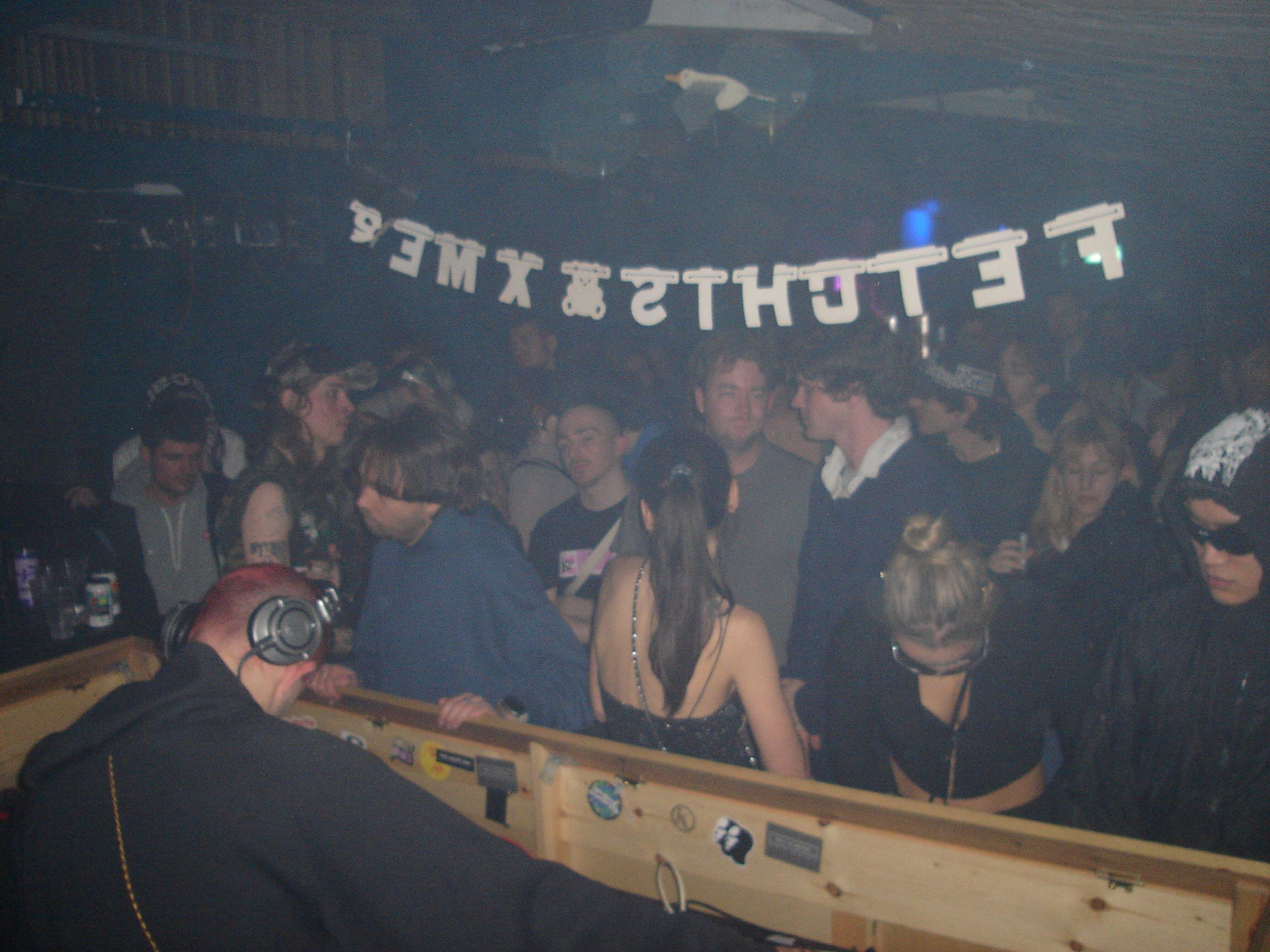Fetchish: An Intellectual’s Club Couture
“No party like an afterparty”, a sentence etched into my memory like a cigarette burn on my skin. But this is for the people who haven’t been to a Fetchish night yet. Their parties amass like the elation of a pre-game, the climax of the party, the ecstasy of the afters. Their club nights feel like starting in the middle, like an explosive eradication of linearity. Like a child playing dress up. Like an adult drinking go-go juice. Like growing pains, bones which stick out to make the flesh bend over the muscle fat. It hurts but, soon enough, you’ll be able to dance.Fetchish is a creative studio and club night based in London, attracting a crowd of estranged rebels in a shared love of sonically transcendental nocturnal adventures. An intentionally triple-entendre concept, the eponymous club name conceives the idea of the commodification of exactly that—a fetishized night of self-indulgent performance. Besides Miss Zlata Mechetina, Creative Director and Club Curator, the Fetchish team includes art direction by Arsen Mollakaev (a designer and curator of @tomorrow.type.today), Anastasia Kozlova (a 3D designer, with one of the recent projects affiliated with SOPHIE), and Reka Goetz (a Central Saint Martins FCP student). They oscillate between anachronistic and art historical references in book design, 3D motion, and TikTok. Their promoter is Henry Spychalski (a lead singer from HMLTD rock band), with Ekaterina Gordeeva (a film and dance producer, affiliated with @dance.film.performance as an ultimate producer, and Sofiko Chachanidze (a secret meme account owner) completing this triangular structure of media influence with a digital, quasi phantom-of-the-opera presence.
My displaced confidence gave me a sort of audacity, which made me believe I could write a piece worthy of delineating Fetchish’s complexity. Fetchish is an endearingly bizarre situation awaiting those who resonate with this essence of egoism and the aforementioned peculiarity. Fetchish acts as a link between club and theatre; “The key is an interest in multimedia & interdisciplinary curiosity, healing, alternative modus of knowledge, and rhizomatic community-making”, they explain. “Each event boils down to constructing a unique spectacle, reflecting a common desire to build up recursive self-lores as well as dancing for queer/hybrid storytelling of Eastern European youth, and decay of any vertical powers and empires”.
A trained eye will take notice of the fact that I have seldom said anything concrete about the conceptualization of Fetchish. Ambiguity is fun, but it is also tedious. I like words that mean something. Running officially for 3 years, the golden, if not worrisome age, Fetcish has synthesized a tremendous allure of obscurity. Worrisome because, even after these three years, the impossibility of describing this fantasy project that would make anyone with a passion for peculiarity blush, seems greater than ever. So allow me to lift the veil of pseudo-intellectual terminology and be particular for a second. What better way to do this than to call the superintendent herself?
After my “What’s up” and Zlata’s “I’m hanging out with my cat”, a dialogue about the next Fetchish night began. Their most recent event took place in February, a collective turn to Spring’s fortunes. A fortuitous night it was, combining a Mario Kart gaming segment with a discussion about an autocratic ideology of boyhood, followed by a (loosely planned) counter strike gameplay, all coming together with an epilogue of dance. It is a true night of hybridity; “When people say hybrid nowadays, it means lack of idea and context. For us it means an explosion and abundance of lore”, says Zlata. She continues, “It’s mostly about intellectuals in the club, normalizing the idea that you can find somebody who is both smart and hard-core. We have a lot of Eastern European people because of our background, so this has become one of the main themes of Fetchish”. Hence, if you’re keen on finding yourself a Russian doll or a mythological creature from the Balkans, you’re in the right place.
Following our call, I sat down to write and began to decipher the puzzle of our conversation. Zlata left me with a reference article to look through to get a feel for how to format our call. “The greatest ever portrait of Frank Sinatra was missing one thing—Frank Sinatra”. I understood this to mean that I should draw my subjects without their immediate presence.
Electronic nomadism and minimalism are the surrealistic identities you shall encounter in the Fetchish spaces. Its creatures exist in a universe between Myspace and Telegram, and anything mainstream is simply not welcome.
Be niche. Be specific. Behave so that every time somebody asks how you are you need to launch into a fifteen-minute soliloquy about your past indiscretions and five-year plans.
Fetchish is a night of absolutes and extremes. A church with the DJ booth as its gospel. Beats, darkness, and communal movement create a trance-like experience. The audience is part of the performance, mirroring the immersive nature of the vibrating walls, dancing along to the pulsation of the music. Fetchish not only breaks but grabs, dismantles, and stomps on the idea of a mystic fourth wall. It will bring you closer than you have ever been with another. “At its core, Fetchish has always been about fostering a deep sense of care and support for one another”, says Zlata.
In addition to Fetchish, the team (along with the long-term collaborator Atay Ilgyn) runs the sister (and brother) internet corporations “Everyone is a Girl” and “Everyone is a Boy”. They include all things internet, weaving a web of references that feel both precise and obscure, and always playful—having a distinct parallel in their operative word: everyone. Radial inclusion is only natural for a community as tight as theirs, creating an irreplaceable and unmistakable atmosphere of indulgent commitment. Expect curational four-dimensionality and terrifying discipleship (read this as purposefully obscure, we won’t tell you what to expect: expect nothing). Oh and, prepare to meet the love of your life. After all, if they are not at the afters, are you really meant to be?
Each presence is a performance, each outing a night at the opera.
A couple of years back, I sat smoking in my new London flat, no table, one mattress on the floor, having just moved from the depths of Eastern Europe, and decided (like everyone else in London) to pick up a newspaper on my way to work. On the cover, in bold, worn-out letters, was the title, “Bright Young Things”. Nevermind the fact that I am now dating one of the guys on the cover, a then attributed “young” and “bright” Mr. Burkitt; what I found most interesting was the narrative construction of a seemingly ordinary night out. Every single one of those brightest, youngest things, in what might look like a suit for the boys and a gorgeous gown for the girls, is actually a costume. Fetchish very much abides by this ideal of oneiric pretend, a place for transformation, both personal and creative. The cover story ended with a remark similar to mine: “There are rules to stay sane. You need to understand that, to a certain extent, London nightlife is a theatre and everyone’s playing a role. It means you won’t take it all too deeply”. So if the lunatics are truly running the asylum, all that’s left to do is dance, sing, break a chair, rip your tights, and put on your mask of choice. Just make sure that when the night is over, both your glass slippers are still on, and your pumpkin carriage hasn’t turned to stone.
Now that performativity seems to be the vanguard of every club night, I ask the question:
Is there such a thing as a non-fictional night anymore? Has the rarest commodity actually become sincerity?
Is there anything for the simple dancer anymore? The pedestrian uni-goer? The mundane passer-by? The confused traveller? The nocturnal regular?
I am convinced smoking is coming back into fashion only because of its member’s access to the “smokers area” private club. The 20 pound price tag on a pack of Blue Camels is more easily digested than a 20 pound club night ticket. I mean, I’ve been to parties in New York, Paris, and London where the cool, scene kids won’t even head in—they’ll merely bump into some friends in the queue outside and sit down on the pavement to gossip and take photographs. But this is a secret, non-verbal agreement: increasingly, people are going out not for the purpose of shaking ass in a dark basement, but to meet their desired internet sirens they’ve been following for months. What they don’t know, however, is that their temporary idols are never on the dance floor (what if someone steps on their Miu Miu ballet flats?!); they are in the green room or the smoking area, maintaining their own “fictionality” and performance of the night.
In an age where we spend more time thinking about an Instagram story than the music we are paying to see, it comes as no surprise that the right “costume” for the night is more important than the person you barricade inside. Just look at the paradoxical clash between modern make-up and garments: whilst “no make-up make-up” and clean girl aesthetic is on the rise—the dirtiest, sleaziest Y2K clothes are coming back into style. Reject modernity, embrace tradition? This mantra might have worked when we could still separate the two, instead of being caught up in the symbolism of every t-shirt style and brand by which we categorize each person.
I’m trying to avoid being cynical about the fashion economy of the art world, and its voracious hunger for the forever new amphitheatrical product, which is perhaps a symptom of a much wider transformation, seen not only in art but clearly in our ritualistic outings as well, irrelevant of how much “art” the event actually consumes and consummates. The way you hold your cigarette and touch your hair, the way your sweater drapes and your shoes are tied, these have become the carefully executed steps in the ballet of clubbing. One-Two-One-Two; the dancing Waltz is now a dance of conversation. Armour yourself with a savvy pick up line, and maybe, just maybe, you will be fine.
A “fuck you” careless attitude: that’s the uniform. But, I am merely a voyeur, an observer with binoculars, standing in these aforementioned smoking areas. If it weren’t for my smudged black eyeliner and generally offensive demeanor, perhaps I would find out why it is that people find these “rave theatre” events, like Fetchish, to be their choice on a Friday night. “Corrupt club music”, as they call it. Who is it that enjoys the corruption of their sacred outings? Is this corruption immersive or escapist? I remember when robust social outings of excessive alcohol and cigarettes used to be about letting loose and going home with a random someone. Now, events are increasingly sober or have a specific dress code which involves the intake of a certain designer drug. “I got so pistachioed last night”. We used to look for others in clubs. Now we look for ourselves.
All photos courtesy of Fetchish







